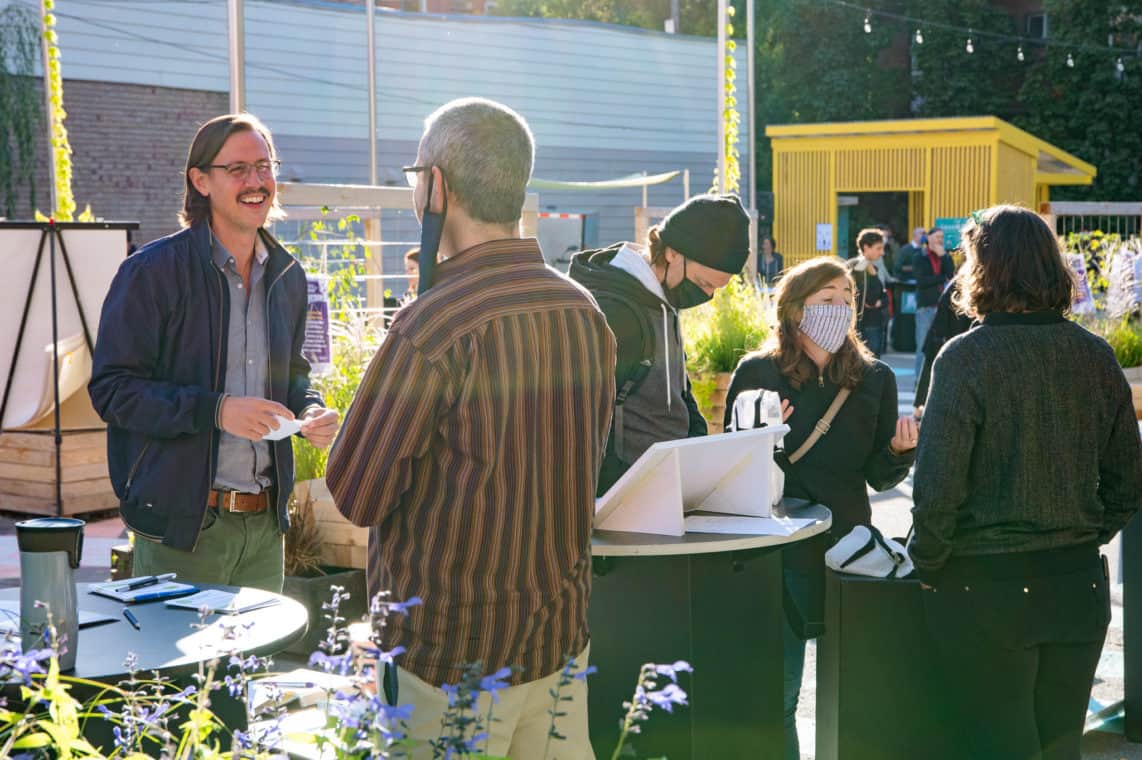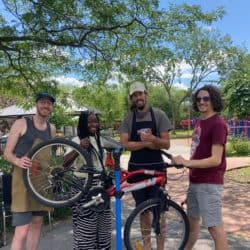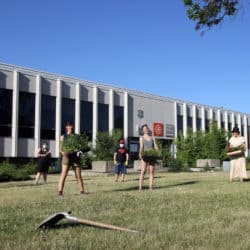Collective action happens when people meet, have fun, imagine, and share and test their ideas. Solon is rooted in a citizens’ movement that focuses on mobility, energy, and “third places” – spaces that are separate from the home (the “first place”) or the office (the “second place”).
Non-profits tackle big problems: poverty; inequities in health, education, and work access; sexual and racial discrimination; refugee crises; food insecurity; community development; et cetera. But a cross-cutting challenge calls for their contribution at another level: the climate crisis. In our Mission Transition series, contributor Diane Bérard examines why non-profits and civil society groups should make the socio-ecological transition a core driver of their strategy, how to do it, and how funders can help. She spoke with seven organizations with very different missions, all contributing to the transition in their own way.
Collective action happens when people meet, have fun, imagine, and share and test their ideas. In our seventh, and final, Mission Transition profile, we look at Solon, a Montreal non-profit rooted in a citizens’ movement that focuses on mobility, energy, and “third places” – spaces that are separate from the home (the “first place”) or the office (the “second place”).
Solon (Montreal)
Bertrand Fouss, co-founder, responsible for development and partnerships
Mission: to accompany Montreal neighbourhoods and citizen groups in socio-ecological transition.
What is Solon?
Bertrand Fouss: Solon is a non-profit rooted in a citizens’ movement. In 2015, a group of Rosemont neighbours got together to improve their living environment with simple projects, like green alleys, contributing to the fight against the climate crisis. It created social links and gave us confidence in our collective-action capacity. A more significant project, contributing to the decarbonization of our communities, emerged: a local geothermal energy network. The energy stored in the form of heat below the earth’s surface is used to heat individual, commercial, and industrial buildings. Celsius – the name of our energy project – prompted the creation of our non-profit structure in 2016. The first employee was hired in 2017. As of spring 2022, we are more than 25 employees.
Why did you call it Solon?
BF: Solon was a Greek poet and politician from the sixth century BCE. He is remembered as one of the fathers of democracy, especially of public participation. Therefore, it made him the perfect inspiration, as collective action is our foundation.
How do you define socio-ecological transition?
BF: There are a thousand and one variations; we collaborated with the UQAM Research Chair on Ecological Transition to capture them. Between June 9 and July 6, 2020, 10 groups of four participants worked on pieces of a transition narrative. It covers four themes: our relationship with time, reclaiming the economy, resilience, and social justice. For instance, the participants imagined their ideal week: instead of a tempo being imposed, energy and needs are respected; there’s space to improvise and share everyday moments with others; unpaid work and time dedicated to the community is valued; and there’s time to take care of ourselves and others.
The Solon community co-created a transition narrative. What’s next?
BF: This is a living document. I hope it will be updated and the community will take ownership. It can be an inspiration for a play, a street or a park animation, a workshop, a class, or any other cultural or social activity.

What kind of assistance does Solon provide to citizens and neighbourhoods on their transition journey?
BF: Our team can help them define their project, find partners and networks, find funding, and everything necessary to get from idea to reality. For more complex projects, we create a dedicated in-house team. And sometimes, Solon incubates projects imagined by a third party.
What transition issues does Solon address?
BF: We work on mobility, energy, and third places. Mobility and energy are no-brainers, but let me explain the relevance of third places. Collective action happens when people meet; third places are gathering places separate from the house or the office. Solon creates spaces where people meet, have fun, celebrate, imagine, and test their ideas for transition.
Can you detail your projects?
BF: Our neighbourhood mobility projects include car-sharing between neighbours through a reservation platform, free access to bikes and cargo bikes, and bike rides for elders. The bikes were financed through municipal funding. The Celsius project is now managed by Coop Celsius; members are residents of the two buildings concerned and citizens interested in the project or similar ones. Coop Celsius received government grants from the Investment Readiness Program and philanthropical funding from the Trottier Family Foundation. In November 2021, the first well was dug in a private citizen’s yard to circumvent public-land regulation. The City of Montreal has a great interest in Celsius, seeing it as a technological showcase for the energy transition. Thus, we are working on Lab Celsius, an informal collective think tank to test different energy-transition technologies. Coop Celsius is a project; Lab Celsius is a long-term decarbonization initiative.

In 2019, Montreal was one of the 20 finalists of Canada’s Smart Cities Challenge. Solon was included in the application. What was your contribution?
BF: The Smart Cities Challenge encourages cities to explore how to improve citizens’ lives through innovation, data, and connected technology. Montreal organized workshops to collect ideas in preparation for its April 2018 application. Solon contributed with its mobility vision, and it was selected for the city’s application. After winning the $50-million grant, the city created Montréal en commun, a community implementing 13 projects related to the food supply, mobility, and regulation. Solon is the lead for mobility projects. For the next three years, we will work on scaling. For example, in March 2022, a group of citizens from Plateau-Mont-Royal borough launched their version of LocoMotion, the bike and cargo bike initiative.
How does Solon contribute to socio-ecological transition?
BF: Our projects reduce greenhouse gas – that is the visible part. But I do not consider this our most important contribution. With the help of other groups, we change the context for transition initiatives. We bring them closer to people’s lives. For example, Solon is part of a movement that influenced the Montreal 2030 Strategic Plan. This 10-year vision has four pillars; the first is to speed up the ecological transition.
What are the transition’s most important levers?
BF: I will name two underused levers: storytelling and regulation. Socio-ecological transition is a social and collective project, not a technological matter. So we have to find how to make it everybody’s story. And regulation is essential. No transition is possible without it.
What is the biggest hindrance?
BF: The individualist culture we have built triggers powerful resistance reactions in all of us. We have to talk about sobriety one way or another: our wealth is generated by a system reaching its limits. The question is: how do we escape the “ever more” loop? And how can less become better?
Suppose you are invited to speak to a group of foundations. What would your presentation be about?
BF: I would talk about time and money, starting by asking foundations, “Do you have the patience to work with us?” Socio-ecological transition is an urgent matter and a long-term process. It needs enormous means, way beyond citizens’ contribution. So I would challenge foundations to use their expertise to develop innovative financial tools for projects outside traditional market returns. And I would make sure foundations grasp that the transition is not a new funding category. It is a horizontal challenge related to all dossiers.

